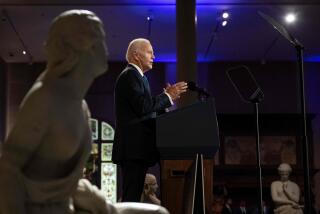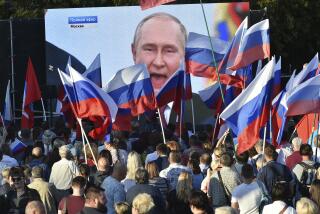U.S. Needs to Assess Whether Gorbachev Remains Best Hope : Soviet Union: The conflict between Gorbachev and the republics presents the U.S. with a dilemma: Both sides have legitimate and persuasive claims to American support.
- Share via
The Bush Administration is about to confront one of the most difficult and painful questions in the history of Soviet-American relations: Has Mikhail S. Gorbachev outlived his usefulness?
The continuing political struggle in the Soviet Union is forcing that question onto the political agenda of the West. On one side of that struggle are Gorbachev and his allies, who want to maintain a strong central government. Opposing them are the leaders of the Soviet Union’s 15 constituent republics, led by Boris Yeltsin, the president of the huge Russian Federation. Some of these leaders insist on a much more decentralized government with wide powers in their hands; others will settle for nothing less than complete independence. All reject Gorbachev’s proposed new Soviet constitution, which reserves considerable power for the central authorities.
At stake are the most fundamental political issues: Who will control the country’s armed forces? Who owns its resources? Who will have the power to tax and regulate the economy?
The conflict between Gorbachev and the republics presents the United States with a dilemma: Both sides have legitimate and persuasive claims to American support.
In Gorbachev’s favor is the fact that he has presided over the sweeping changes in the Soviet Union over the last five years, which have brought unprecedented liberty at home and ended the Cold War abroad. If he were to leave office, some fear, his conservative critics in the KGB, the army and the Communist Party might well try to seize power and reverse his policies of reform.
Moreover, the United States needs some central authority, whether or not headed by Gorbachev, with which to negotiate on military matters. Gorbachev has provedcooperative both on those issues and on the confrontation with Saddam Hussein.
On the other hand, what Gorbachev’s opponents in the republics are seeking is what the United States has always supported: national self-determination. And although he inaugurated the sweeping changes in the Soviet Union, there are signs that Gorbachev is no longer the most ardent champion of such changes. He has, for example, resisted the kinds of economic reforms advocated by both his opponents at home and Western experts on the Soviet economy.
In many cases, these opponents are more committed to Western-style democracy than Gorbachev, who remains, after all, the head of the Soviet Communist Party.
The American government does maintain cordial relations with public officials of rival parties and different political persuasions in other countries. But this is not a precedent for dealing with the Soviet Union today, because in most other countries the division of powers among different levels of government is well-established and universally accepted. This is precisely what is in dispute between Gorbachev and his critics.
The Bush Administration has tried to avoid taking sides in the Soviet power struggle. This is a sensible policy for the United States, but it is unlikely to remain feasible for much longer.
Several Soviet republics are demanding formal international recognition. The Baltic nations sent representatives to the recent summit meeting in Paris of the Conference on Security and Cooperation in Europe. They requested admission to the organization and were rebuffed, but will certainly petition for membership in other international bodies. The United States will be forced to declare itself one way or the other.
More urgently, the prospect of food shortages in the Soviet Union in the coming months is beginning to galvanize emergency aid from the West. Distributing food requires dealing with some established authority. With whom should the United States deal?
The Kremlin-directed central administration over which Gorbachev presides may be so inefficient and corrupt that it cannot get food to the people who need it. But bypassing it would align the United States with Gorbachev’s opponents.
Thus, as the weather turns cold across the Russian steppes, the Bush Administration will have to decide whether, despite his many virtues and historic achievements, Mikhail Gorbachev continues to represent the best hope for a peaceful, prosperous, stable Soviet Union.
More to Read
Get the L.A. Times Politics newsletter
Deeply reported insights into legislation, politics and policy from Sacramento, Washington and beyond. In your inbox twice per week.
You may occasionally receive promotional content from the Los Angeles Times.







